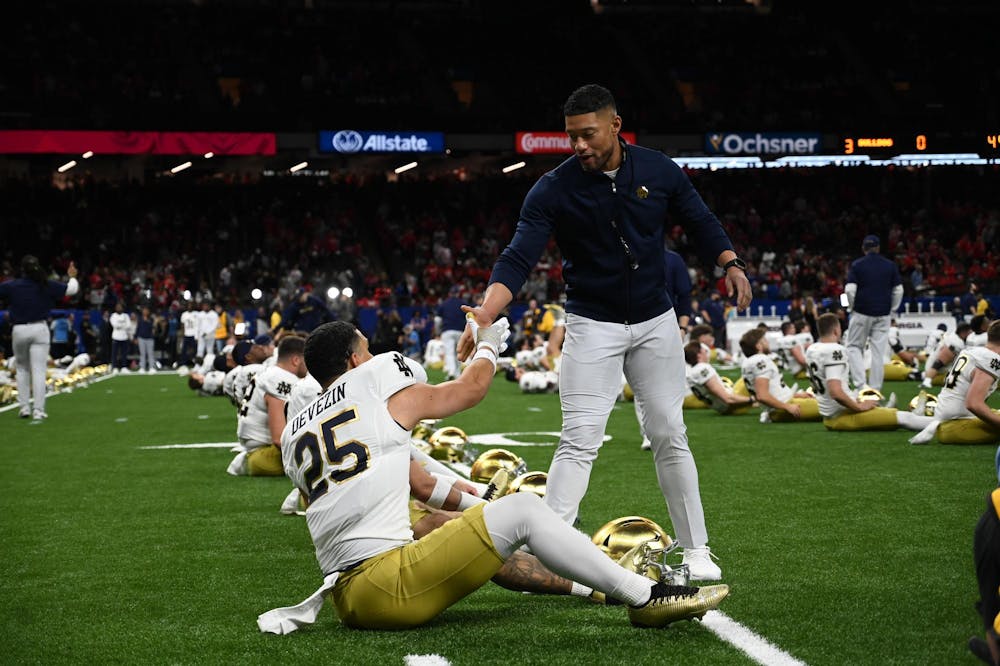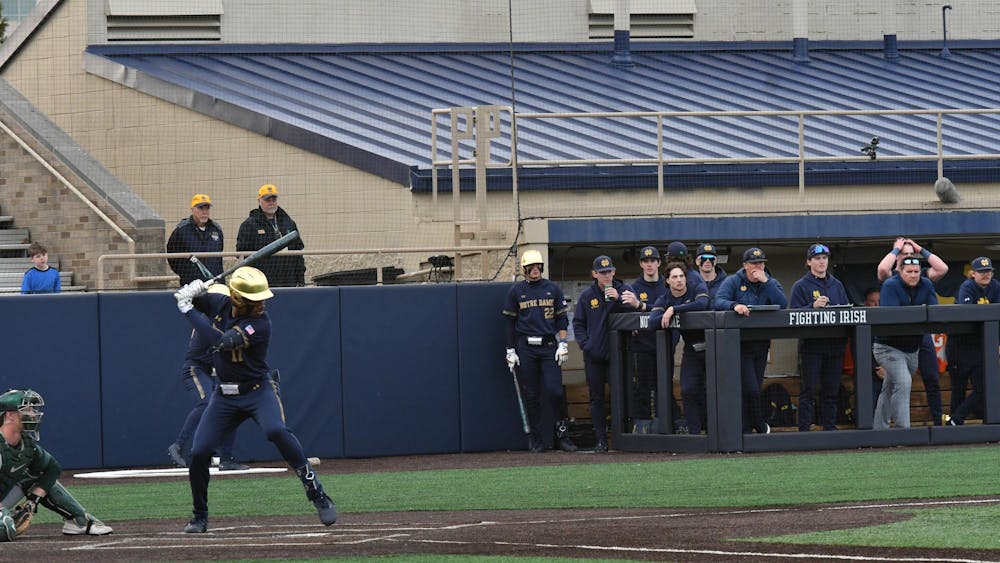In his third season as head coach of Notre Dame, Marcus Freeman has silenced the doubters. More than that, he has cemented himself in the upper echelon of college football coaches. The journey has been far from easy. Freeman began his tenure 0-3 after blowing a 28-point halftime lead to Oklahoma State in the Fiesta Bowl, losing the season opener on the road against Ohio State and, worst of all, suffering a devastating upset to Marshall in the home opener a week later. While the Irish would recover in his first season with a marquee win against then-No. 6 Clemson, they dropped another inexplicable game to a 3-9 Stanford team that same season. Freeman’s second year was also marred by poor performances, including a pair of lifeless defeats to Louisville and Clemson after a heartbreaking loss to Ohio State in the last second at home, a game infamously defined by its final play where the Irish defense lined up with only 10 players on the field. Returning a wealth of talent in the expanded 12-team playoff field, Freeman’s third season became playoff or bust, and with a light regular season schedule, even failing to host in the first round constituted a disappointment.
The Week 1 road opener against Texas A&M was shaping up to be the most important game of the season. Going into College Station in front of over 100,000 Aggie faithful, the Irish earned a program-defining win. The game felt like a culmination of Freeman’s growth as a coach, as he prepared his young offensive line to hold up against the ferocious A&M front, made all the right fourth-down decisions and willed his team to victory by mentally and physically outlasting the Aggies. Then, one week later, NIU happened. All of a sudden, with a tough test against then-No. 15-ranked Louisville looming at the end of the month, Notre Dame went from being a projected 12-0 No. 5 seed to facing playoff elimination before October. Should they have lost that, some challenging discussions were on the horizon. But as he had done throughout his entire tenure, Freeman responded to adversity. After righting the ship with a demolition of Purdue the following week and a comfortable win against Miami (Ohio), Notre Dame ousted the Cardinals in a 31-24 thriller to stay alive. But the NIU loss meant they would have to be perfect for the rest of the season. It’s one thing to bounce back from a horrible loss, but it is another to sustain success and take care of business every single week. Freeman had not yet proven he could do that. With a manageable schedule, how would he handle success to get his team over the finish line?
His answer: a 10-game win streak outscoring opponents by a combined 314 points. In that span of games following the NIU loss, Notre Dame delivered the worst loss of the season to each team they played barring Virginia and USC. While the schedule was straightforward, the Irish did more than beat who was in front of them, they ran them off the field. After finishing the year 11-1, Notre Dame earned the No. 7 seed in the CFP playoff, matching up with No. 10 Indiana in the first round. The first postseason home game in college football history would be in Notre Dame Stadium. Before the playoff run began, Freeman signed an extension reportedly worth up to $9 million per year, putting him in the ballpark of the highest-paid coaches in the country. Notre Dame believed they had their guy. It was time for him to prove it on the biggest stage. He passed the first test with flying colors in a one-sided 27-17 win over the Hoosiers. A garbage time touchdown provided Indiana with some window-dressing, but the Irish dominated from start to finish. They moved on to face No. 2 seed SEC champion Georgia, one of the blue bloods of the sport. After the game was postponed a day, the Irish went into the Caesars Superdome in New Orleans and left with a comfortable 23-10 win to punch a ticket to the CFP semifinal. I can confidently say this was the best game Freeman had coached up to that point. His team won in every phase of the game. Similar to the A&M game, he took a conservative, mistake-free approach to the offensive game plan, and pushed all the right buttons at the right times. The highlight was a drive that didn’t lead to any points but did manage to completely ice the game. Beginning on their own 9-yard line, the Irish offense put together a 12-play 41-yard drive that ate up seven minutes and 36 seconds of clock before pinning the Bulldogs deep down two scores with under a minute remaining. The drive was sparked by Freeman’s call to run his offense back on the field on 4th and 2 on the Irish 18-yard line, drawing Georgia offsides and moving the chains. The defense, as they have all season, shut Georgia’s offense down. The standout unit, however, had to be special teams, highlighted by the Jayden Harrison kickoff return to open up the second half and put the Irish in the driver’s seat. But while Freeman was flawless in the Sugar Bowl win, he one-upped himself against Penn State a week later.
The 27-24 win over the Nittany Lions was the greatest of the Freeman era not only because it punched Notre Dame’s ticket to the national championship, but because it served as a testament to the culture he has built throughout the season. An Irish team depleted by injuries on both lines was being overpowered in the trenches. After playing his worst half of the season, Riley Leonard exited the game with a head injury, leaving backup Steve Angeli to lead a two-minute drill at the end of the half. Somehow only down 10-0, Notre Dame needed points. After putting together a few completions and miraculously recovering a lost fumble, Angeli and the Irish offense set Mitch Jeter up to knock in a 41-yard field goal that cut the deficit to 10-3. Whatever Freeman said to his guys in that halftime locker room lit a fire under them. Receiving the ball to start the second half, they put together an emphatic eight-play 75-yard drive capped off by another rushing touchdown for Riley Leonard, who returned to the game after going through concussion protocol. They would score again on their next drive to take a 17-10 lead. Penn State would respond with two touchdowns of their own, the second aided by a controversial pass interference call in the end zone that kept the drive alive. Once again, the Irish responded. Jaden Greathouse broke free for a 54-yard touchdown reception, and after Nittany Lions quarterback Drew Allar threw a terrible interception, the offense set Jeter up to kick the game-winning 41-yard field goal. Overcoming mountains of adversity, Freeman’s Notre Dame found a way once again.
In the national championship, Freeman has the opportunity to avenge last season’s heartbreak against his alma mater. But win or lose this game, one that Notre Dame enters as heavy underdogs, he has proven his status as an elite coach. This goes beyond the in-game decisions, which from the 4th-down calls to the trick plays, have been managed brilliantly all season. Head coaches, especially those who don’t call plays as is the case with Freeman, are asked to be CEOs. Freeman has excelled in every aspect of that title. He brought in two outstanding coordinators in Mike Denbrock and Al Golden, both of whom have raised the ceiling of their respective units massively. He utilized the transfer portal to acquire talent in key roles. The headline was undoubtedly Riley Leonard, but Rod Heard II has played meaningful snaps throughout the entire playoff run, Mitch Jeter, despite his midseason struggles, made the first CFP go-ahead field goal, Harrison returned the kick against Georgia and RJ Oben came up with the strip-sack in that same game that set up a Beaux Collins touchdown catch. While none of these players have been incredible in every game, they have made huge contributions in the biggest moments. Across the roster, the impact of Freeman’s incoming recruits is also evident. With young stars from Adon Shuler and Leonard Moore in the secondary to Bryce Young and Boubacar Traore on the defensive line, the depth of this Irish roster has been bolstered by recruiting classes that have already rivaled many of Brian Kelly’s best. Freeman’s success has coincided with a level of buy-in from new athletic director Pete Bevacqua that has been nonexistent for the past few decades of Irish football. Bevacqua has shown a genuine hunger to build the program back into one of the best and is putting his money where his mouth is. Within this rapidly growing infrastructure, Notre Dame could be on the cusp of something special. The Freeman era has begun in South Bend. It may prove to be a long and prosperous one.










